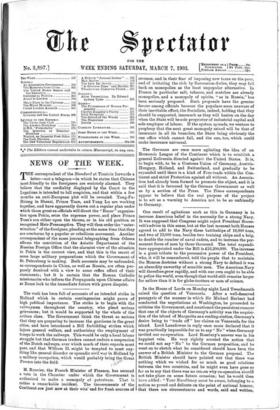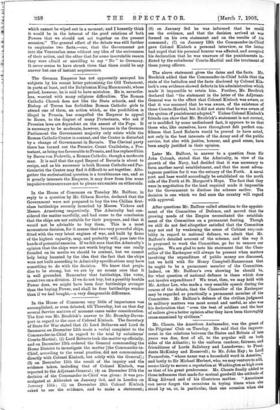In the House of Lords on Monday night Lord Tweedmouth
raised the question of Venezuela. After a well-deserved panegyric of the manner in which Sir Michael Herbert had conducted the negotiations at Washington, he proceeded to criticise the Government, and mentioned the persistent rumour that one of the objects of Germany's activity was the acquisi- tion of the island of Margarita as a coaling-station, Germany's desire being to "trade off" her claims on Venezuela for the island. Lord Lansdowne in reply once more declared that it was practically impossible for us to say" No" when Germany invited our co-operation. Lord Rosebeiy's answer was in his happiest vein. He very rightly scouted the notion that we could not say " No " to the German proposition, and he went on to sketch what he considered should have been the answer of a British Minister to the German proposal. The British Minister should have pointed out that there was nothing which we wished for so much as good relations between the two countries, and he might even have gone so far as to say that there was no reaaon why co-operation should not take place on some future occasion; but he would then have added : "Your Excellency must be aware, belonging to a nation so proud and delicate on the point of national honour, that there are circumstances and words, said and written, which cannot be wiped out in a moment; and I honestly think it would be in the interest of the good relations of both Powers that we should not act together on the present occasion." The general effect of the debate was still further to emphasise two facts,—one, that the Government got into the Venezuelan mess without any idea of the seriousness of their action, and the other that for some inscrutable reason they were afraid or unwilling to say " No " to Germany. It never seems to have struck them that there could be any answer but one of instant acquiescence.











































